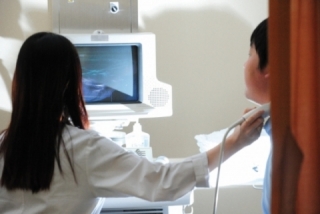Amid the continuing dispute over the over-diagnosis and overtreatment of thyroid cancer, a local university announced a research result Thursday, providing new diagnostic criteria for the disease inflicting Koreans, whose characteristics are different from foreigners’.
The Catholic University of Korea Seoul St. Mary’s Hospital said it hoped the latest study would solve the prolonged controversy over the excessive diagnosis and treatment of thyroid cancer in the nation.
Korean doctors remain divided into two groups over the issue – one group believes in the excess while the other does not think so.

The former group cited a series of studies in 2011, which found 81 out of 100,000 people were diagnosed with thyroid cancer, nearly 10 times higher than the global average. The latter says thyroid cancer can metastasize and be fatal for patients, stressing the need to get more positive – if cautious – in diagnosis and treatment.
Development in the United States added fuel to their controversy. Last April, the U.S. reclassified thyroid cancer from encapsulated follicular variant of papillary thyroid carcinoma into noninvasive follicular thyroid neoplasm with papillary-like nuclear features (NIFTP) -- not a cancer in other words.
The decision came after findings that many papillary thyroid carcinomas are similar in appearance to cancer cells, but not as dangerous. The change was expected to affect around 10,000 of nearly 65,000 thyroid cancer patients a year in the U.S., according to the New York Times.
"By removing the word cancer, the term NIFTP acknowledges the low malignant potential of these tumors," Medscape quoted Kepal N. Patel of New York University Langone Medical Center as saying.
“This will potentially affect the way the disease is viewed by caregivers and patients [and] eliminate the psychological impact of receiving a cancer diagnosis,” Dr. Patel went on to say. “Furthermore, [this] should decrease the overtreatment that the term cancer often breeds, which in turn will reduce treatment costs and also lessen the risk of patients being exposed to unnecessary risk,"
The reclassification abroad raised a stir in Korea with some doctors using the news as evidence for over-diagnosis and overtreatment of thyroid cancer in Korea.
To solve this issue, the Catholic University of Korea, Seoul St. Mary’s Hospital conducted a study on 6,269 Korean patients who were diagnosed with a type of papillary thyroid carcinoma from 2008 to 2014 using the American NIFTP system.
The study found that only 105 of the total number of patients -- or 2 percent, unlike 10-20 percent among Americans and Europeans – belonged to NIFTP, indicating that there could be an over-diagnosis of thyroid cancer applied by a strict standard.
However, the study also found that, even with the more stringent diagnostic criteria, 2 percent of 95 NIFTP patients develop lymph node metastasis, forcing researchers to conclude that NIFTP cannot always be considered a benign tumor, although doctors can remove the tumor through surgery.
In the study, a mutation analysis of major genes involved in cancer development also revealed a possibility of error when applying NIFTP diagnostic criteria to the Korean demographic, causing researchers to call for the establishment of new diagnostic criteria that can close holes in current standards.
Although the controversy will continue for some time, the domestic study has shed some light on the need for reforming NIFTP standards to better fit treatment in Korea, and the need for improvement in the sector, medical experts here noted.

